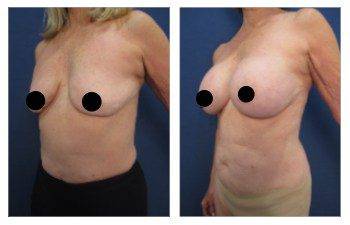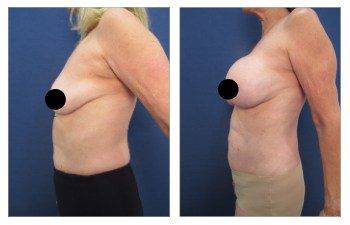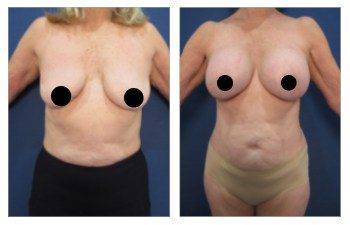




A 69-year-old female patient completed breast augmentation revision after she presented and told SurgiSculpt, “My breast implants have popped.”

Introduction: My Saline Implants have Popped
When your saline implants popp, they require a very different approach than silicone implant ruptures. This is because the saline implant deflates immediately like a car tire. The advantage of a saline implant is that you will know pretty quickly that you have a problem. This is because the implant volume literally disappears within a week.
This means that you don’t have to worry whether your implant has popped or not. It is either intact and inflated or popped and deflated. This is in contrast to silicone implants which you cannot easily know whether they have ruptured. In fact, early signs of a silicone implant rupture can be a slight twinge or no signs at all!
If you are worried about a silicone implant rupture you have no recourse but to obtain a screening mammogram or ultrasound if you are young. After the age of 50, screening mammograms are routinely ordered every other year through your insurance company.
Treatment of Popped Saline Implants
Treatment for saline implants differs from silicone implants. Treatment for saline popped implants requires immediate attention and revision surgery. This is because when the implant deflates, the breast tissues around the implant will collapse and contract around the implant. If the breast tissues are not expanded back out within a few weeks, patients do have the disadvantage of having their breast tissues contracting.
What makes breast tissue contraction a difficult problem is that it becomes technically difficult to achieve breast symmetry during breast revision surgery when one side has contracted and the other side remains inflated.
This is because the contracted breast tissues will not act like the supple breast tissue on the contralateral, unaffected side. This is in contrast to a ruptured silicone implant which has its silicone gel leak out but not immediately escape.
In patients with a ruptured silicone implant, there are no immediate changes in the breast shape and no immediate contracture. This provides patients with ample delayed leeway to have their breasts revised. However, patients with ruptured implants should be cautioned that prolonged delays of several months to years in replacing ruptured silicone implants will result in a secondary deformity called capsular contracture.
Conclusion: My saline implants have popped
In summary, if you are worried that your saline implants have popped, we encourage you to seek the care of a breast specialist. Your breast specialist will be able to easily diagnose a popped saline implant.
He or she will also urge you to have this implant replaced sooner rather than later to avoid breast tissue collapse and contracture. If you had your saline implants placed years ago, you may want to consider replacing both sides. If you have your implant cards, you should bring them with you so that your surgeon can order your replacement implants to match your old ones. In addition, it would be helpful to track down your surgical notes so that your surgeon will appreciate how much volume was used to inflate your saline implants.
Traditionally, saline implants are overinflated; this means that if you have 300cc saline implants, they are typically overinflated to 330ccs. This consideration is most important if you are going to replace your saline implants with silicone implants which are not adjustable.
Finally, depending on your implant manufacturer, you may actually be able to obtain a warranty replacement and potential compensation for your revision surgery. We encourage you to make a consultation with a SurgiSculpt provider to figure out the details.
